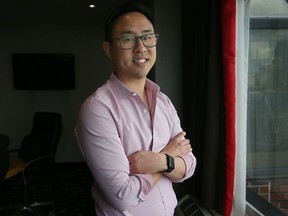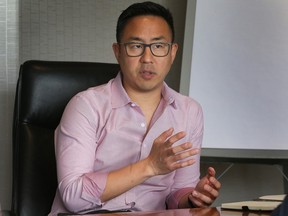
Article content
London nativeDr. Andrew Park will seek progress in some wide-ranging challenges — including doctor fatigue — as the new president of the Ontario Medical Association.
Advertisements 2
Article content
“In general doctors are feeling burned out,” he said during an interview at the Best Western on Thursday. “We’ve been at the center of this maelstrom for the past three years, and we’ve done everything that we can to provide care for the communities, despite our own fears.
“Certainly, we’re seeing a drop in morale. It’s about making the system work better for everybody. If we do that, I think that patients get the care they need and deserve, and physicians (can) enjoy the job again.”
Park, who was in Windsor for the OMA’s annual general meeting with about 100 delegates attending and more virtually, will spend his year-long presidency pressing the organization’s priorities as outlined in its report, Prescription for Ontario: Doctors’ 5-Point Plan for Better HealthCare.
Article content
Advertisements 3
Article content
Released in October 2021, the report said the COVID-19 pandemic created a backlog of 22 million health-care services.

The OMA consulted with patients, health-care stakeholders and physicians to come up with the plan’s recommendations, Park said.
The recommendations include:
- Reducing wait times and the backlog of services;
- Expanding mental health and addiction services in the community;
- Improving and expanding home care and other community care;
- Strengthening public health and pandemic preparedness;
- Giving every patient a team of health-care providers and linking them digitally.
Park acknowledged that’s a big agenda for a term of one year, but he said, “it’s about progression and moving the needle.”
Advertisements 4
Article content
“Certainly, there’s political will,” to improve the health-care system, he said. “They understand that the OMA is a … voice for 43,000 (physicians). We have the government’s ear.”
The competing interests of health care and the economy means acquiring more funding is a challenge, he said, yet the two are intertwined. “Economics and health care are central to addressing the growing mental health and addictions issues facing Ontario.”
While the pandemic created lengthy backlogs, one positive aspect that rose out of necessity was the growth of virtual care, which had a “huge impact,” he said.
But mental health challenges have grown. “Surely, mental health and additions have gotten worse. … It was a real struggle to start with, access to services, and that’s something that has only been worsened by the pandemic.
Advertisements 5
Article content
“We need to support our community and our members who are struggling in a way that helps them not fall so hard as some of them really have over the course of the post-pandemic period.”
Hiring more doctors is a key plank of the OMA’s plan.
Last March, the Ontario government announced more than 450 new post-secondary positions across all six of Ontario’s medical schools. The 2023 provincial budget included $33 million over the next few years towards that goal.
That means there will be a total of 1,200 undergraduate positions and 1,600 postgraduate medical positions by 2028.
But that’s not enough, Park said.
The provincial government announced in April that the college of Physicians and Surgeons of Ontario, the regulatory body for doctors, will make it easier for physicians trained in the US, Ireland, Australia and Britain to practice in Ontario.
Advertisements 6
Article content
“We have one of the best medical training programs across the country, but we also need help,” Park said.
I’ve trained side-by-side and I’ve worked side-by-side with foreign grads. The pathway for education and training and licensing is really evolving and the bottom line is that if you are capable of being in the system, then we want you.”
As more immigrants come to Canada from different cultures, people in leadership positions with different backgrounds become important, said Park, who is the first East Asian president of the OMA.
“It’s not something that I sought out to do … to be the first East Asian president of the Ontario medical association. … To have that distinction is certainly a huge honor.
Advertisements 7
Article content
“Diversity isn’t just necessarily how you look, it’s about the experiences you lived and how you see a problem. At the point where we’re at right now, we have some major problems and having different viewpoints and seeing it from different angles allows us to come up with novel solutions that help everybody.”
The growing diversity in his hometown of London is an example, he said. “London was a lot smaller growing up. It’s gotten bigger. …We’ve increased in our diverse makeup and that’s a real source of pride for me. It wasn’t the most diverse city to grow up in, now that I see that shift of the landscape of the city I think it’s excellent. I’ve seen a real evolution in the city and I’m still proud to call it home.”
Twitter@MacLeodWindsor

Comments
Postmedia is committed to maintaining a lively but civil forum for discussion and encourages all readers to share their views on our articles. Comments may take up to an hour for moderation before appearing on the site. We ask you to keep your comments relevant and respectful. We have enabled email notifications—you will now receive an email if you receive a reply to your comment, there is an update to a comment thread you follow or if a user you follow comments. Visit our Community Guidelines for more information and details on how to adjust your email settings.
Join the Conversation